Supercharging pathways from evidence to impact: Supporting the delivery of parenting interventions at scale
The recently published World Health Organisation guidelines on parenting interventions to prevent maltreatment and enhance parent–child relationships presents five evidence-based recommendations to support the development and delivery of effective parenting interventions worldwide. But how do we turn evidence into impactful action? If we are truly going to achieve impact at scale, it is imperative that we harness our collective efforts around innovation and advocacy to shift the frontier of cost, reach, and impact, writes Global Parenting Initiative lead Dr Jamie Lachman of the Universities of Oxford and Cape Town.
Over 1 billion children globally experience violence each year, with a disproportionate number in the Global South. Almost half of children under five are at risk of not achieving their developmental potential. If this doesn’t concern you, it should. Beyond the human cost of lifelong pain and trauma, violence against children and poor child development outcomes have been linked to a host of societal issues, including increased risky behaviours, low educational attainment, and the intergenerational transmission of violence. The economic cost, too, is considerable, with conservative estimates putting this at 5% of global GDP, and some studies estimating this as high as 8% - that’s trillions of US dollars every year. Addressing these issues has been prioritised by the UN, with Sustainable Development Goals (SDGs) 4, 5 and 16 aiming to ensure quality education and development, ending violence against girls, and ending all violence against children by 2030.
Yet, despite the substantial evidence that parenting programmes can prevent violence against children and improve child well-being across multiple contexts, settings, and populations, only 26% of governments report that they are reaching all parents who need support. So what is missing? Impact at scale. To achieve these goals, effective parenting interventions must be scaled up to reach all parents, everywhere.
The barrier to scale up
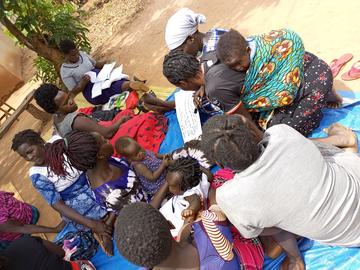
A Parenting for Respectability session in Uganda
The effective scaling of parenting interventions requires expanding programme coverage to larger populations and embedding delivery into existing systems. However, very few parenting interventions have achieved this scope of delivery, and those that do often fail to maintain programme effectiveness or sustain implementation.
The challenge ahead of us is three-fold. First, in-person parenting programmes typically reach only hundreds of beneficiaries, while the need is in the millions. Many interventions are too complex and costly to be delivered at scale, especially in settings with limited financial and human resources. Second, many interventions are proprietary-based with prohibitive licensing and training fees in addition to restrictions on the adaptations that can be made to ensure fit with local contexts. The promotion of individual programmes, as opposed to supporting common evidence-based parenting approaches more broadly, may also not be the most efficient nor effective approach. And third, the development and testing of programmes often fails to consider how they will be embedded at scale within existing delivery systems, often neglecting to involve key stakeholders, including governments, NGOs, communities, and most importantly, families, in decision-making.
If we are truly going to be able to achieve impact at scale, it is imperative that we harness our collective efforts around innovation and advocacy to shift the frontier of cost, reach, and impact.
Frameworks for impact
What does this look like?
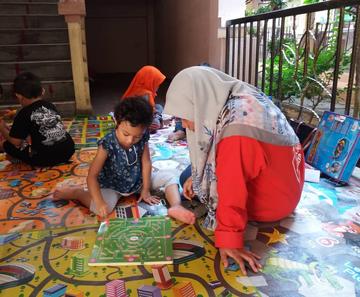
Playing during a Parenting for Lifelong Health Session in Malaysia
First, it’s all about the evidence. Adopted programmes need to demonstrate evidence of impact on key child and family outcomes. The WHO identifies these as child maltreatment; harsh and negative parenting; positive parenting skills and behaviour; child externalising/behaviour problems (e.g., oppositional, aggressive delinquency, drug use); child internalising problems (e.g., anxiety, depression, post-traumatic symptoms); and parental mental health and stress. Programmes have also been shown to reduce intimate partner violence and improve child development and learning, so expanding the evidence base to measure these domains is also important. Policymakers and implementers should build on existing evidence about what works, especially since we have seen that programmes tend to work just as well when transported from one context to another and that home-grown and transported programmes are equally effective. As innovation and scale-up of existing evidence-based programmes continues to evolve, they must continue to demonstrate impact on these outcomes at scale when delivered via different modalities (e.g., digital, hybrid, or remote). Building user-friendly, integrated, and scalable monitoring and evaluation (M&E) systems is necessary to measure and ensure this quality of delivery and impact at scale.
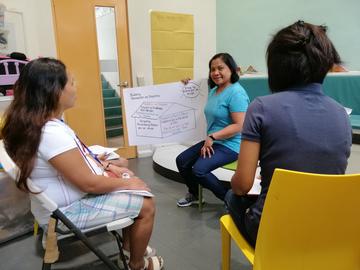
Parents at a MaPa session in the Philippines
Second, programmes need to be low-cost and scalable. Effective violence prevention programming at a population level requires collaboration across sectors, including health, social welfare, education, and justice, to integrate into existing government and NGO service delivery systems that face substantial resource constraints. Therefore, interventions must be designed with scaling in mind and must be viable in the low-resource regions where families need them most. To enable scale-up, structures must be put in place to support implementing agencies to deliver interventions with fidelity and quality, to ensure that effectiveness is maintained as delivery expands.
Third, programmes need to be open-source and non-commercial. Large-scale delivery in low-resource settings should not be hampered by the cost of materials or royalties. Open access and cost-effective interventions are far more likely to have large-scale impact. Previous studies have demonstrated this with programmes designed for low-literacy populations, which can be implemented by non-professional staff, and are freely accessible under Creative Commons licensing.
Fourth, programmes should be adaptable and culturally-relevant to local communities and families. Culturally-relevant interventions may be more likely to have engaged and satisfied participants, thus achieving greater impact. We also know that programmes not designed to be adaptable run the risk of ad hoc and reactive adaptations (for example, to simplify or reduce costs) that may drift away from the evidence base. Luckily, parenting programmes are readily adaptable across contexts and settings. The sustainability of programmes also requires establishing local partnerships to tailor culturally appropriate interventions from the ground up.
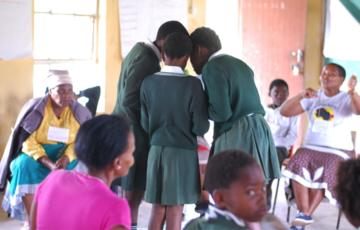
Schoolchildren at a Sinovuyo Teens session in South Africa
Fifth, scale-up of parenting programmes must be sustainable: Programmes should build and respect equitable partnerships. This is crucial for the sustainability of these interventions, and for their development, delivery, evaluation and scale-up. Traditionally, there has been an imbalance of power between the Global North and the Global South in the delivery of this kind of intervention, with most academic experts and funding residing in the Global North. However, a crucial precursor to any successful scale-up is shared ownership. The scale-up of parenting programmes must embrace a decolonising approach that respects the agency of local researchers, implementers, and beneficiaries.
And finally, programmes should have empathy towards the challenges that parents and caregivers face, while also recognising the perspective and fundamental rights of the child, including the right to play.
An innovative and integrated approach
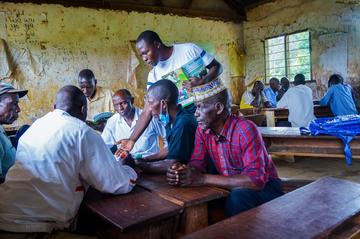
Engaging men during a Parenting for Respectability Session in Uganda
Meeting this list of prerequisites for impact at scale requires a multifaceted and innovative approach. Researchers, technical experts, policymakers, governments, donors, implementing agencies, programme managers, community stakeholders, and families must work closely together to find solutions to each challenge. It will require shifts in thinking and the creation of new systems and technologies to support delivery, adaptation, and evaluation. This is not just a pie-in-the-sky wishlist. We believe it can and must be done if we are to have a chance at making a significant impact on the reduction of violence against children. In fact, it is being done. The Global Parenting Initiative (GPI) is working closely with Parenting for Lifelong Health (PLH), alongside UNICEF, WHO, the Early Childhood Development Action Network, and the Global Partnership to End Violence Against Children, a consortium of organisations which make up the Global Initiative to Support Parents (GISP), and hundreds of local and international partners across the world to develop these very solutions.
This effort involves integrating the recent push towards innovative digital health strategies sparked by the Covid-19 pandemic into existing solutions for scale-up. We are adapting the existing evidence-based, open-source, low-cost PLH in-person parenting programmes developed and tested in low-resource settings into a solutions suite that combines digital, hybrid, and in-person delivery for tailored, systems-level delivery. This combination of modalities offers the best chance to reach the greatest number of families at scale.But before going to scale, we need to focus on generating evidence and creating scalable monitoring, evaluation and learning frameworks for these and similar interventions.
First, we must determine the most effective, cost-efficient delivery methods and modalities for parenting interventions. This requires a thorough approach to evidence generation, research, and analysis of what works in different contexts. Additionally, a flexible technological ecosystem that can integrate with existing government systems is necessary, ensuring wide adoption and implementation of these interventions.
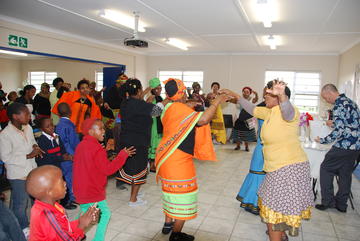
Celebrating the completion of the Sinovuyo Kids programme in South Africa
Second, we need to establish simple, yet robust, M&E systems that enable implementers to assess the effectiveness of interventions in real-time. Tracking user engagement across various aspects of the parenting intervention allows for data-driven adjustments to programme delivery. In the long run, the insights and evidence gathered from both successful and unsuccessful implementation experiences contribute to refining existing parenting strategies and fostering the development of innovative approaches.
To meet these needs, and to respond to the challenge of balancing adaptation and fidelity, we are developing a digital asset management system to enable closer collaboration of programme stakeholders. This innovation will allow agencies to flexibly mix and match analogue, digital and hybrid approaches in response to the diversity and complexity of individual community contexts, while maintaining programme integrity.
Next, the long-term sustainability of programmes at scale will require building and strengthening local partnerships and capacity. We must build and strengthen partnerships by facilitating collaboration and shared leadership amongst international, regional, national, and local stakeholders. To ensure that local institutions can effectively support programme adaptation, evaluation, and delivery, we must provide capacity exchange and shared learning opportunities with country-level systems-building partners in the Global South.
We must also harness emerging research and lessons learned to advocate for evidence-driven policymaking and investment on local, country, regional, and global levels to support the sustained institutionalisation of parenting support. So, too, we must build the capacity for advocacy amongst local research and implementation partners to work with national governments and donors towards the goal of parenting support for all.
Lastly, we must extend the reach and impact of inclusive parenting solutions to the regions that need them most. This will require developing local infrastructure, training frontline service providers, and providing technological assistance to enable scale-up and institutionalisation in government, NGO, and private sector systems. It will also require specific targeting of underserved communities in humanitarian crisis context as well as for male caregivers and families with disabilities.
The GPI, PLH, GISP, and our partners and donors are collaborating to achieve a common goal of providing free, evidence-based, and engaging parenting support worldwide. Our ultimate aim is to enhance child development and education outcomes while preventing family violence on a global scale. The WHO Guidelines have brought us one step closer to achieving this vision. Various structures are even now being put in place to enact the solutions discussed. By working together, we can make our vision of a world where children are safe and free to achieve their full potential a reality.
How can you or your organisation contribute to this vision? Get in touch with the GPI at information@globalparenting.org, PLH at info@parentingforlifelonghealth.org, and GISP at info@support-parents.org.
Note: This article was edited on 11 May, 2023.




